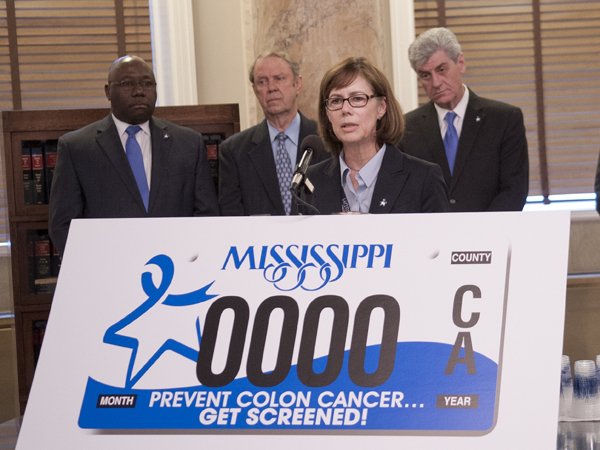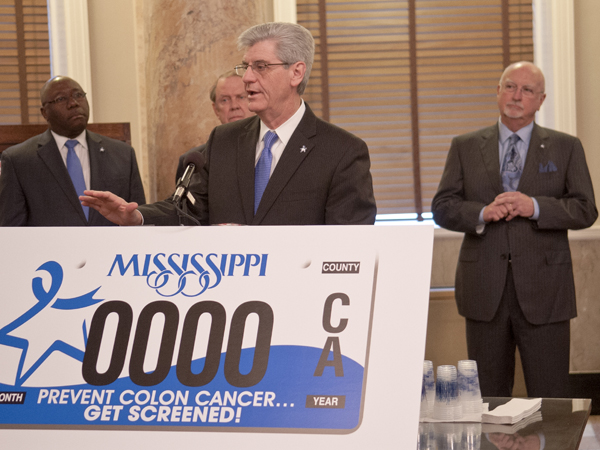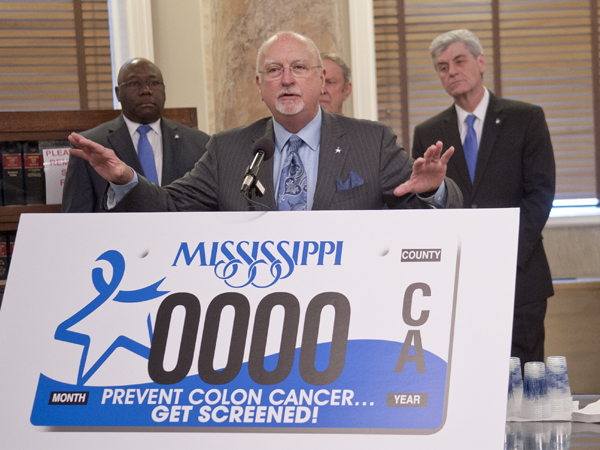50 or older? Get screened and join the 70X2020 Initiative

State leaders and health officials gathered today at the Mississippi Capitol to address the state's dismal ranking in colorectal cancer morbidity rates, a figure that can be drastically reduced by early screening methods.
"The real tragedy is that this can be prevented," said Gov. Phil Bryant, who joined officials in championing the 70X2020 Colorectal Cancer Screening Initiative.
That program has a goal of ensuring at least 70 percent of Mississippians will be up to date with recommended screening by the year 2020. It's suggested that the first screen for colon cancer occur at age 50, with a second screen 10 years later. For African-Americans, the first screening should occur at age 45. If there's a family history of colon cancer, a screen every five years is recommended.

"Early detection of cancer can save your life," said Bryant. "I thank UMMC, the Mississippi State Department of Health and leaders in the health-care community for helping spread the word and for encouraging Mississippians to be screened for cancer."
The American Cancer Society estimates that in 2015, 1,460 Mississippians will be newly diagnosed with colon cancer and 640 will die of it. Mississippi has the highest colorectal cancer death rate in the United States, and colorectal cancer is also the second-leading cause of cancer death in Mississippi.
As the nation observes Colorectal Cancer Awareness Month in March, a number of leaders in the cancer-fighting community were at the state Capitol to urge colorectal cancer screening.
"Screening is so important, because it can lead to the prevention or early treatment of colorectal cancer. During the screening process, precancerous lesions can be located and removed," said State Health Officer Dr. Mary Currier. "This is one of those screenings that should not be put off. With screening, you can avoid colorectal cancer altogether."

After getting the all-clear on a colonoscopy performed in 2000 when he was 50, retired Tupelo gastroenterologist Dr. Sam Pace got an ironic shock on a follow-up screening in 2011: He had colon cancer.
"For my entire life, I've been on the business end of a colonoscope, doing screening colonoscopies. I've performed about 20,000 over 34 years," said Pace, who was 61 when diagnosed, was experiencing no symptoms and had no family history of colon cancer. "But I was practicing what I preached, and it was time to have the next screening. I wouldn't be standing here today if I hadn't had that screening.
"I am not cured. I'm in remission," said Pace, former president of the Mississippi Gastrointestinal Society and Mississippi's governor for the American College of Gastroenterology. "And if I hadn't caught it so early, I wouldn't even be in remission."

There are simple and affordable tests available, and individuals 50 or older should be screened, said Dr. Roy Duhé, associate director for cancer education at the Cancer Institute and an organizer of the 70X2020 effort. Many private insurance companies offer coverage, so individuals should ask their insurance company how much they should expect to pay. Medicare covers a number of colorectal cancer screenings for those 50 and over.
An estimated 58 percent of Mississippians who are eligible for a colorectal cancer screening get one. "How great it would be, and how many colon cancers would we prevent, if that number were approaching 80 or 90 percent," Pace said. "That's what the 70X2020 initiative is all about."
To learn more about colorectal cancer, click here.
To learn more about colorectal cancer screening, click here.


